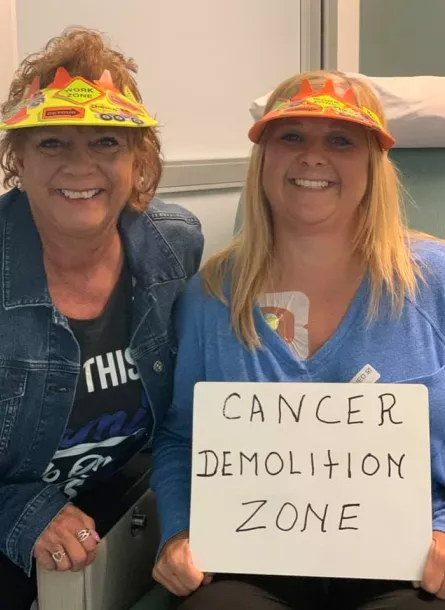
Chemotherapy, radiation, and other therapies for colorectal cancer
Your doctor may recommend chemotherapy, radiation therapy, immunotherapy, and/or other therapies to treat colorectal cancer.

Treatment therapies
Your doctor may recommend chemotherapy, radiation therapy, immunotherapy, and/or other therapies to treat your cancer.
How is my type of treatment determined?
Treatment for colorectal cancer depends on several factors including the:
- location of the tumor
- stage of the cancer
- tumor pathology
- overall health of a patient
Every case is different. Your best resource is your doctor, who knows the specific details about your diagnosis.
Common therapies for colorectal cancer
Chemotherapy
Chemotherapy is treatment with cytotoxic drugs that are injected into a vein (IV) or pills taken by mouth. These drugs travel through the bloodstream and destroy cancer cells.
Radiation therapy
Radiation therapy is a form of cancer treatment that uses high-energy rays to destroy cancer cells. Rectal cancer is treated with radiation more frequently than colon cancer.
Immunotherapy
Cancer immunotherapy, also known as immuno-oncology or biological therapy, is a form of cancer treatment that uses the body’s own immune system to help prevent, control, and eliminate cancer.
Targeted therapy
Targeted therapy uses drugs to target and "turn off" specific genes and proteins that help cancer cells grow.
Liver-directed therapy
There are a number of therapies that use chemotherapy, HAI therapy, ablation, radiation, cryotherapy, heat, and other approaches to reduce or remove liver metastases.
HAI therapy
Hepatic Artery Infusion (HAI) therapy is an FDA-approved cancer treatment that delivers medicine into the liver through the hepatic artery.
More about treatment
ChemotherapyTop resources

EPIC Act to Advance New CRC Therapies Needs Support
The EPIC Act would encourage investment in clinical trials for additional uses of existing drugs.

Colorectal cancer resources for learning and sharing
Whether personally impacted by colorectal cancer (CRC), supporting a loved one, or dedicated to educating and empowering others, these downloadable and printable resources can help.

Michelle Cappel: Biomarker testing extends life
Michelle Cappel owes a lot to colorectal cancer biomarker testing — seven years of life and counting.





